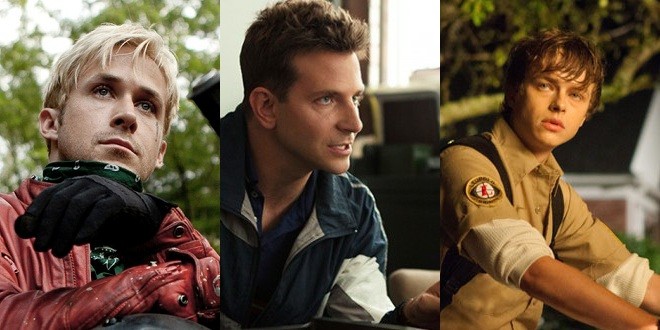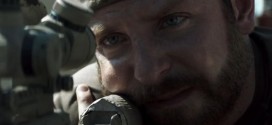Spoiler Scale (How spoilery is this article on a scale of 1 to 10?): 3
As the credits rolled at the conclusion of the 140-minute The Place Beyond the Pines, I immediately wondered if the film is as successful as the novel in conveying the three distinct-but-related stories of fathers and sons. And much to my surprise, I found out that the screenplay – penned by director Derek Cianfrance (Blue Valentine (2010)) and relative newcomers, Ben Coccio and Darius Marder – is not based on a novel at all. (The title is a loose translation of the Mohawk word “Schenectady,” which is also the upstate New York town where the film is set.)
The tragedies laid before us occur both on and off the screen – some are sudden and violent, and others are slow and corrosive. Luke (Ryan Gosling), a carnival stunt rider who grew up without a father, wants to provide for his newborn son but lacks a legitimate skill set to do so. Avery (Bradley Cooper) rebels against his own father, a politically savvy judge (Harris Yulin), by entering the police force after law school – only to later experience the rebellion of his own son A.J. (Emory Cohen). Jason (Dane DeHaan) struggles to find his own identity in terms of his father.
As subtlety tends to be a rare commodity in epic dramas of interconnected lives, perhaps it is best to describe The Place Beyond the Pines in terms of what it is not. Thankfully, there are no plagues of biblical proportions (Magnolia (1999)) or heavy-handed socio-political agendas (Crash (2004)). Rather, the ambition of The Place Beyond the Pines lies in creating and conveying characters who are morally textured with varying shades of grey. Cianfrance’s long and uninterrupted takes from the first person draw the viewer deep into their perspectives. And Cianfrance’s efforts are fueled by one of the best ensembles in recent memory. While much has been made of the shorthand casting of Gosling (ostensibly in full Drive (2011) mode) and Cooper’s “stretch” into a rather conflicted role, more should be said of the supporting cast of Ben Mendelsohn, Bruce Greenwood, Ray Liotta, Mahershala Ali, and most notably, Eva Mendes and Rose Byrne as the women charged with dealing with all of these men in crisis.
When all is said and done, The Place Beyond the Pines offers no grand answers to the age-old debates of nature versus nurture – only muted parallels and bittersweet ironies. And all of that would be fine – even refreshing – but for the odd timing of the film’s emotional crescendos. That said, Cianfrance is betting we will care enough about the characters to care about the film, and perhaps it’s a bet worth making. But for many viewers, I suspect that the overall experience may beg the question – in constructing an emotionally compelling narrative film, how much subtlety is too much subtlety?
Grade: B






Intriguing. How would you compare the timing of the emotional crescendos here to those in Blue Valentine (and did you like that film?)? I quite liked BV; the emotional journey/pacing was unique in many ways there and made me curious about Cianfrance’s next project, which this film, of course, is.
I would have given ‘Blue Valentine’ the same grade, although I cannot remember too much about the details of the narrative structure. I do think there is common interest in exploring the family/domestic relationship in very frank and uncompromising ways between both films. The Place Beyond the Pines has a lot more juggling to do … Did you see The Place Beyond the Pines yet? Because if you have, I could be very specific about what I would have changed about it to fix the problem 🙂
Haven’t seen it yet. I’ll check back in when I do!
Well, I don’t want to give anything away, but the narrative structure IS different. Whereas (as I recall) ‘Blue Valentine’ was non-linear – converging on a single emotional point, ‘The Place Beyond the Pines’ is three stories told in a linear fashion, and I think that is the problem. … We can discuss further after you see it 🙂
Yes, that’s a good description of BV, I’d say. And yes, I could see three stories might make the emotional points tricky. Trying to think of another movie where different stories/main characters really works? Letter to Three Wives, maybe.
Still have to see the movie, but I’m very interested to see it. Now only to find the time to head to the cinema 🙂
My wife and I saw the movie yesterday, and had pretty identical reactions: the acting was by and large excellent, the scale of the story was ambitious, individual scenes worked very well… but the whole thing didn’t gel.
What it felt like was that there was simply too much story for the time allotted, and so at certain points we, the audience, were asked to fill in the narrative based on our past experience with Plot X or Plot Y, which works at odds with the freshness of many of the scenes, because it essentially piggybacks on movies already made. The This Was Never Going to Work / Just One More Caper story, the I Almost Lost My Soul in the Corrupt Cop Shop story, the Sons of Protagonists Doomed to Collide in Semi-Biblical Fashion story.
And that’s a shame, because there are individually so many good film elements going here: script, acting, cinematography, score. But we are robbed of the emotional payoff at crucial points because the film checks its watch and says Well, Will You Look at the Time… Must Dash.
Perhaps it needed to be made as a miniseries.
Yes, it seems strange that the follow-up film from the writer amd director of ‘Blue Valentine’ would have these particular flaws.